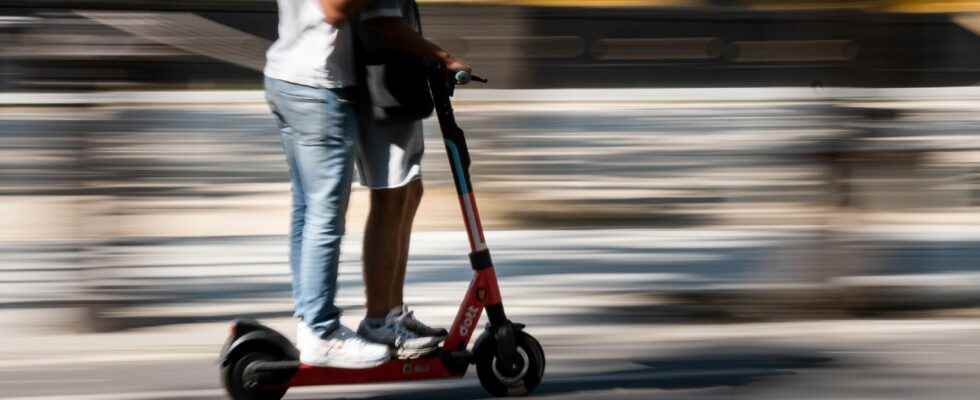I hadn’t set foot in Espace Cardin since that evening in January 2002 when I kissed Dora for the first time on the mouth and, suddenly, found the room sensational.
Twenty years later, I have the impression that they haven’t changed the chairs. Could the stinginess of the great couturier have been transmitted to the buyer of the room? If the show hadn’t been so sensational, I would have resented the Théâtre de la Ville in Paris, still under construction, for taking refuge there. There are works everywhere, in Paris. It makes you wonder if it’s war or the Olympic Games that we’re preparing to host. The mayor of Paris, at the height of her demago hypocrisy, pretending to realize, after ten years, that Parisian pedestrians are in the middle of the Far West, suggests that they vote against free access scooters.
I’m talking about this because there’s a scooter in The Force that destroys everything, the David Lescot musical that we attended, Dora and I, without thinking for a second of kissing. Partly because of this scooter that goes back and forth from the courtyard to the garden and from the garden to the courtyard, graceful, a tad comical. I prefer scooters in the theater than on a sidewalk, where they purposely run into me.
In principle, I hate musicals, even in the cinema, that exasperates me; those of Jacques Demy too. There, it’s something else entirely. It starts with an air of theOrontea by Antonio Cesti (1623-1669) sung by an haute-contre. And then, immediately after, it’s weird, we find ourselves in front of the theater, at the end of this baroque opera. “So you liked it? – I don’t know… I shouldn’t have come.” There are a dozen actors, composing about thirty characters, they walk, like Dora and me, like all those who go to the theater as a couple, and they discuss, a little stunned by what they have just seen. “So, did you like it? – A lot, and you? – Not so much.” They are hungry, super hungry. Like after love, it seems. They are looking for a restaurant in the area. “But what does it tell us? What does it tell us? I hated it, I hated it… It tells us nothing of the world, it tells us nothing of our time… – Well me, it did me good to get out of my time a bit.”
“Did you like it ?”
David Lescot in the role of Anandré, he’s not in a relationship, he’s the only one, he hasn’t let go of his cell phone since the start, trying to reach the high-counter who was singing in theOrontea, he leaves her lots of messages, to no avail. He crosses the stage in all directions, worried, in love, sometimes crossing the scooter. They arrive at the restaurant. “Good evening, we haven’t booked.” The waiter manages to find them a table, for two. Anandré is then seized with a doubt: was it really him, the one he is trying to reach, the high-counter who was singing just now? He’s not sure he recognized it. He questions the people who are dining there, two by two. Nobody answers him. He is lost. They are all lost.
“And at the same time, you can’t say that cooking isn’t an art.” She is also lost if she is a politician, who is a member of the European Parliament, and who, for her electoral campaign, must receive money from a guy who will finally prefer to give his money to a former giton, a young man who was scammed by crooks who bought his agricultural machinery in ethers, a fashionable, very volatile cryptocurrency. He really doesn’t look smart, the kid. The micheton would like to be loved, pathetic, and in the middle of this carnival of stereotypes, Anandré seeks his high-cons. It’s endless, but it makes for a magnificent spectacle.
At the exit of Espace Cardin, holding Dora by the hand, the memories come back to us. Did you like it ? It’s nice when it floats like that, for good, there are no scooters on the sidewalks.
